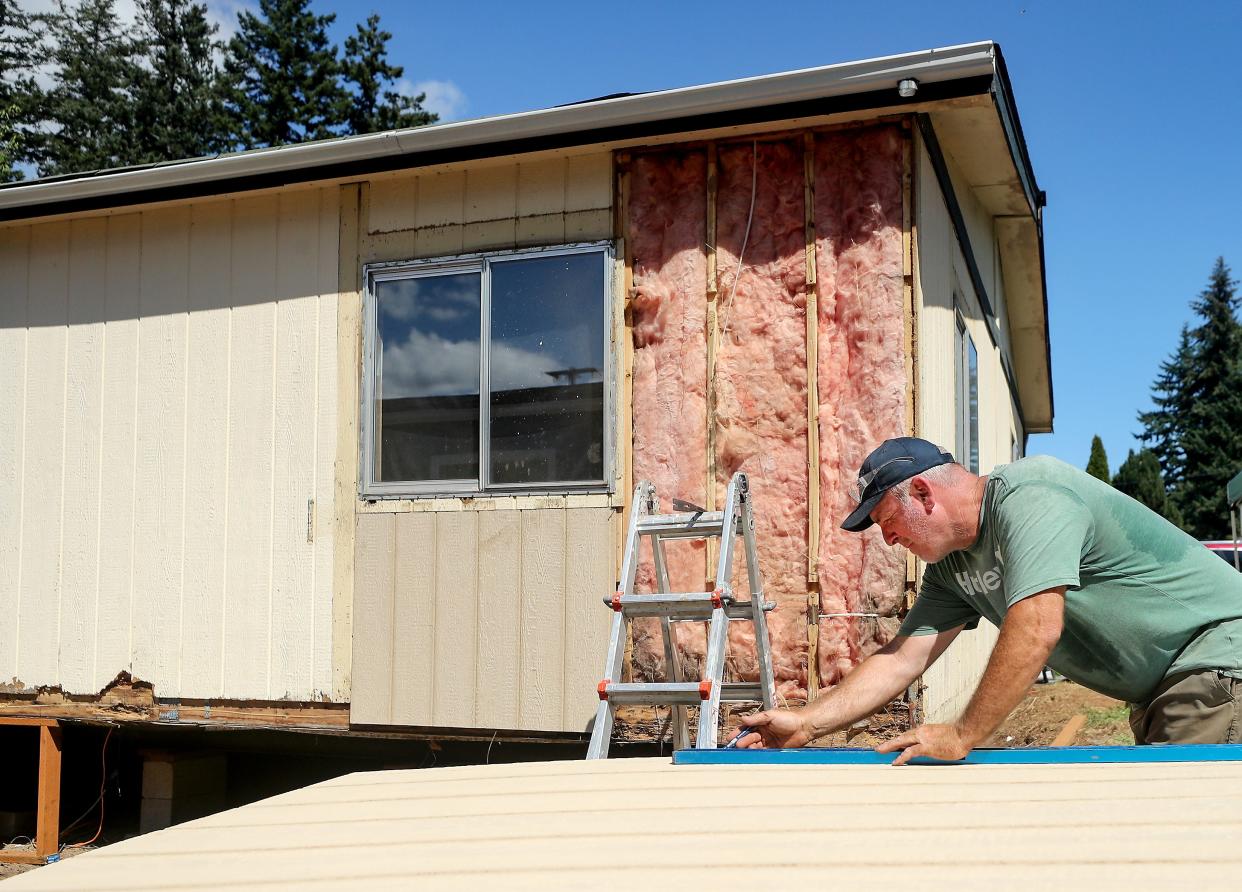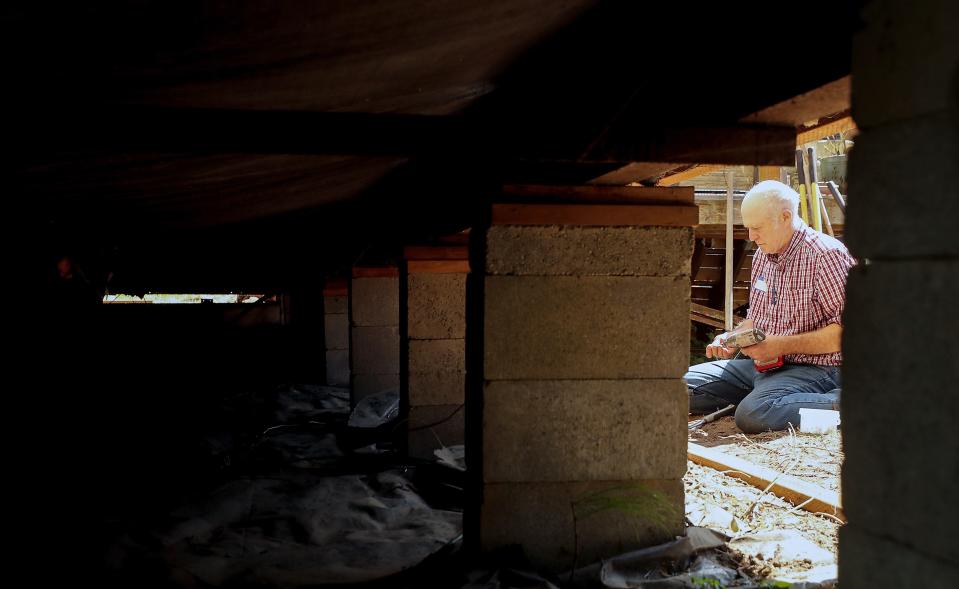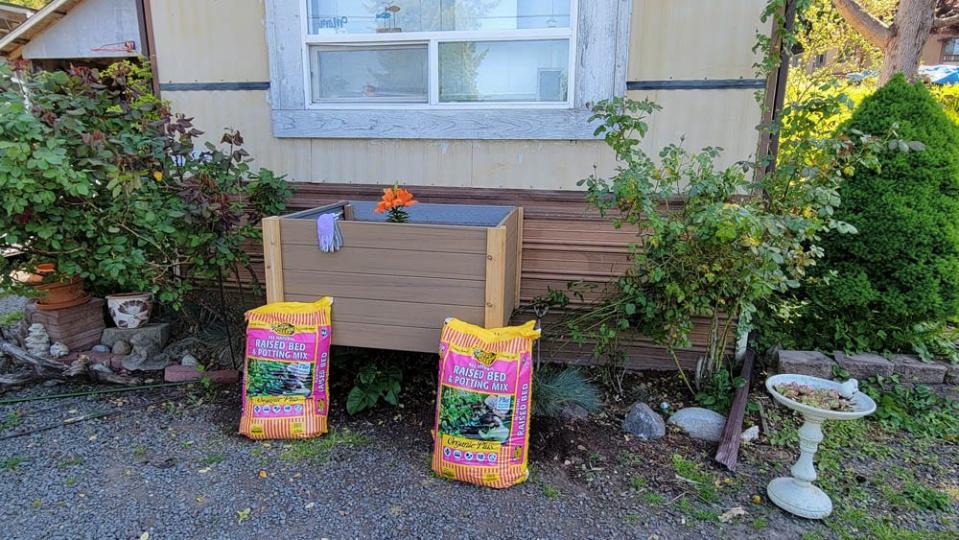Poulsbo Mobile Home Park gets makeover from Bluebills, volunteer handymen

In May, some Poulsbo Mobile Home Park residents appeared to be facing a nearly impossible deadline: beautify nearly all aspects of their home's exterior in 20 days or else be evicted. After the park's residents came together to seek answers from management, the ownership group, GSC investments, clarified that no resident would be threatened with immediate eviction due to a property's condition.
Now, after the Poulsbo community and city government mobilized to help residents and provide some financial relief, physical repairs to residences at the park are underway.
On Thursday, about 15 retired men worked on one home's siding, taking apart pieces of the house that could be reworked, reinforced, and put back. Although the Peninsula Support Organization Bluebills, a volunteer group that started as retired Boeing engineers working as handymen, have been working at the Poulsbo Mobile Home Park for the past few months, this was their first full workday. Other volunteers cleared debris throughout the park.
The need for upgrades stems from a notice that some, but not all, of the residents of the park along Lincoln Road received in spring. As residents and community members reacted to the news, the City of Poulsbo immediately allocated $15,000 from their affordable housing fund. North Kitsap Fishline also promised to step in financially, eventually providing 45 households with $500 in rent relief and case management services.
Then in late June, Paras Shah, a co-founder of GSC investments, wrote to the Kitsap Sun that “the 20 day notice to comply which typically accompanies the home inspections will not be enforced through the rest of the year.”
The city's $15,000 is being used to buy materials for the Bluebills' work. Kitsap Community Resources will also provide between $10,000 and $20,000 to reimburse materials, according to Tony Ives, KCR’s executive director.
Though there is no assurance that repair requirements will ultimately prevent residents from being evicted or priced out, as the ownership group confirmed in May that some price increases are coming, volunteers like the Bluebills nonetheless stepped in to help with the immediate need.
The group decided to start with the mobile homes which were most in need of repair.
“There are two that are really decrepit,” said Michael Crovitz, the technical lead for the project. The house would be a prototype for Crovitz to figure out typical repairs and the best way to get volunteers involved, regardless of skill level.
The resident of the house that they were working on has had a stroke and heart attack, and had no way to pay for the repairs, said Crovitz.
Working with mobile homes can be challenging because they are often made of cheap materials and may not have been built for the Washington environment. The bare bones of the house are 2x2 lumber pieces, which “wouldn’t pass building codes today,” said Crovitz. The structure is 30 years old, which means enough time has passed for cheap materials to mold, rust, or crumble.
The Bluebills’ job is to be strategic about the specific repairs that “balance longevity with quality of investment,” said Crovitz. “We could spend the rest of our lives fixing everything.”

Much of the original material of the house will be reinforced or repurposed. Old skirting that has been ripped, decayed or is falling away will be bolstered by skirting from another part of the house.
The back porch steps had been detached from the house, so that other builders could work in the place it used to be. Although only the bare bones of the porch remained, the Bluebills planned to remove or reinforce the rotted parts while still keeping 75% of the original material.
As for the siding, the Bluebills had removed the most rotten pieces and cut new siding, which would fit into the old like jigsaw pieces. Once they added new window trim where the old met the new and gave the house a fresh coat of paint, no one would be able to tell that there were two different sidings.
Being strategic allowed the Bluebills to make the most of a limited materials budget.
“We’ll get a much heavier duty system without breaking the bank,” said Crovitz.
Crovitz did some quick calculations on the value of the day's labor. Construction labor usually cost $300 a day and there were about 15 Bluebills in attendance, donating about $4,500 worth of labor. A day earlier the volunteer group bought about $2,500 in building materials, which Poulsbo or KCR will reimburse.
Handyman services are only one aspect of the Bluebills operation, which has rebranded from the Boeing Bluebills to the Peninsula Support Organization Bluebills, since the majority of its 200 members are now non-Boeing retirees.
“Most of them are in their 70s, some in their 80s,” said Bob Keever, the vice-chair of the Bluebills. Their newest recruit was a 50-year-old man named Jeff, who was sweating through his shirt as he shaped the siding with a circular saw. “We call him 'the kid',” said Keever.
Rusty Figley, who collaborates with the Bluebills through her work with Catholic Community Services, said that a project like this would normally be beyond the Bluebills’ scope, but they had taken it on because it’s so crucial. Most jobs require just two or three workers, like wheelchair ramps, which they have built over a thousand.
When a community member alerted the Bluebills to the eviction notices at the mobile home park, Keever said, “we realized we needed to get boots on the ground.”

On June 17, the Bluebills completed their first project at the park. One woman had been notified that her trailer hitch had to be removed or covered. She loved gardening, so the Bluebills built a flower box to cover the hitch.
“That got her off the list,” said Keever. After that, “we just started hanging out here and meeting people.”
Josh Brooks, the park manager, took the Bluebills to meet different residents.
Although the Bluebills were waiting for the ownership group to finish inspections of initial work, his group didn't want to wait to start others, since construction season is short.
Keever said that beyond construction skills, the Bluebills’ specialty is to provide project engineering.
Crovitz has worked as a software engineer for companies like Microsoft, where he learned basic project management skills. He has turned the home inspection reports from the ownership group into detailed work plans and material spreadsheets.
Keever estimates that 50 out of 70 homes will need repairs. Crovitz hopes that 30 to 40 will only be minor jobs. “They just need some paint slapped on a window.”
Lisa deFaria, a community organizer and therapist, believes that a third of the homes will be fixed by their owners with some financial assistance.
Keever has noticed something magnetic about the way that the Poulsbo Mobile Home Park project has drawn the community together. DeFaria credits the small-town, caring nature of Poulsbo.
“These people are so amazingly responsive to people in need,” she said. In addition, deFaria believes that the energy comes from an awareness of the lack of truly affordable housing in Kitsap. “Where are 350 individuals going to go? I think we’re keeping people potentially off the streets.”
To learn more about the PSO Bluebills or donate, visit their website: PeninsulaSO.
This article originally appeared on Kitsap Sun: After ownership mandated repairs, the Poulsbo community stepped up to keep residents housed

